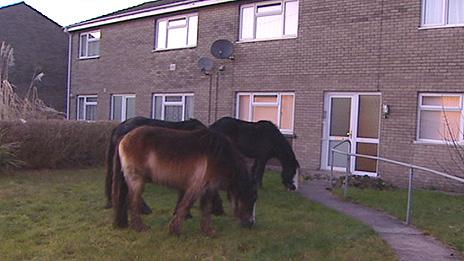Fly-grazing horses at 'crisis point' in Wales
- Published
Dumped and abandoned horses are putting lives at risk, causing a major problem for police and costing councils in south Wales thousands of pounds.
Police say the problem has reached crisis point in Bridgend and the Vale of Glamorgan with 497 calls last month.
An investigation by BBC Wales into so-called fly-grazing has revealed it is an issue from Pembrokeshire to Newport.
Tom Price, who runs "Welsh Gypsy Horses" exporting animals, says he has been the focus of false accusations.
In response to questions from BBC Wales' Week In Week Out programme he insists he is a responsible horse owner and not the only owner of Welsh Gypsy Cobs in south Wales.
Al Francis, a respected horse-breeder who works closely with the Gypsy community, says those who trade in horses have been hit hard by the recession.
He told the programme: "Until people stop this breeding for breeding's sake - this problem will get worse."
The programme has uncovered evidence that the situation is getting worse, with a big rise in calls to police about stray horses.
The RSPCA has investigated nearly 2000 welfare complaints in the last year alone.
Animal charities are also overwhelmed by the scale of the problem.
Put to sleep
The Redwings Sanctuary in Norfolk recently rescued 23 horses that had been left to fly-graze near Cardiff Airport.
Nick De Brauwere, a vet at the centre. said: "Sadly three of them were succumbing to respiratory conditions and the only humane thing to do was to put them to sleep."
Week In Week Out has filmed at a Bridgend Comprehensive School where a dozen stray gypsy horses were running loose in the school grounds.
Head teacher Alwyn Thomas told his constituency MP that it is a common occurrence.
"Children will no doubt be kicked one day - that's a real fear of mine," he said.
When the horses appear a member of the local Gypsy community is called to round them up.
On the occasion the programme was filming at the school, Mr Price's son turned up to assist, but said the horses were not his.
Bridgend MP Madeleine Moon told the programme: "We have horse owners who are irresponsibly driving down the M4 and cherry-picking where they can drop off and deposit their horses."
She is calling for a more efficient and effective way to trace owners and make them more accountable.
Currently all horses are required to have a passport, and foals should be micro-chipped once they reach six months, but some owners are openly flouting the regulations.
Hooded youth
Cardiff council has appointed its own horse warden to round up stray and abandoned animals.
While Week In Week Out was filming with Lucy Hamblett she called for police back-up after a horse she had seized was taken from her by a hooded youth who claimed it was his.
"At the end of the day, I can't fight them. The issue with the police is they don't respond time after time," she said.
However, working with the police, Cardiff council has made significant seizures of large numbers of horses and it believes it is getting to grips with the problem.

Police received nearly 500 calls last month about stray horses in Bridgend and the Vale of Glamorgan
Supt Paul James of South Wales Police, who is heading a task force working in conjunction with local authorities, said a new initiative will send a clear message to horse owners.
"If they're on the highway, we will take them off you: if we take them off you and you want them back it'll cost you £200," he said.
But reporter Nick Palit has discovered the new strategy has already run into problems.
Stray horses that were rounded up and put in a supposedly secure compound were spirited away in the dead of night.
Andrew RT Davies, leader of the Conservatives in the assembly, is calling on the Welsh government to act, and said better co-ordination or additional powers may be needed.
Week In Week Out is broadcast at 22:35 GMT on BBC1 Wales on Tuesday 21 February
- Published6 January 2012
- Published6 October 2011
- Published27 June 2011
- Published26 February 2011